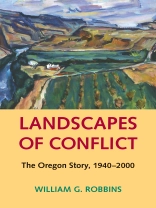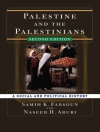Post-World War II Oregon was a place of optimism and growth, a spectacular natural region from ocean to high desert that seemingly provided opportunity in abundance. With the passing of time, however, Oregon’s citizens — rural and urban — would find themselves entangled in issues that they had little experience in resolving. The same trees that provided income to timber corporations, small mill owners, loggers, and many small towns in Oregon, also provided a dramatic landscape and a home to creatures at risk. The rivers whose harnessing created power for industries that helped sustain Oregon’s growth — and were dumping grounds for municipal and industrial wastes — also provided passageways to spawning grounds for fish, domestic water sources, and recreational space for everyday Oregonians.
The story of Oregon’s accommodation to these divergent interests is a divisive story between those interested in economic growth and perceived stability and citizens concerned with exercising good stewardship towards the state’s natural resources and preserving the state’s livability. In his second volume of Oregon’s environmental history, William Robbins addresses efforts by individuals and groups within and outside the state to resolve these conflicts. Among the people who have had roles in this process, journalists and politicians Richard Neuberger and Tom Mc Call left substantial legacies and demonstrated the ambiguities inherent in the issues they confronted.
İçerik tablosu
Foreword: Still Searching for Eden at the End of the Oregon Trail by William Cronon
Preface
Prologue: A Time to Remember
I. Postwar Promise
1. The Great Hope for the New Order
2. Into the Brave New World
II. Making Agriculture Modern
3. Bringing Perfection to the Fields
4. The Wonder World of Pesticides
III. Industrial Forestry Management
5. Planning and Technical Efficiency in the Forests
6. Intensive Forestry and Citizen Activism
IV. Of Rivers and Land
7. Richard Neuberger’s Conservation Politics
8. Tom Mc Call and the Struggle for the Willamette
9. Ecologies of Sprawl: The Land-Use Nexus
Epilogue: The Special Place
Notes
Bibliography
Index
Yazar hakkında
Robbins is Emeritus Distinguished Professor of History at Oregon State University. He has published eight books on the Pacific Northwest, including Hard Times In Paradise: Coos Bay, Oregon (Washington), Landscapes of Conflict: The Oregon Story, 1940-2000 (Washington), and Landscapes of Promise: The Oregon Story, 1800-1940 (Washington).












